ICTICT813: Unit Assessment Pack (UAP) - Manage ICT Services Course
VerifiedAdded on 2023/01/06
|55
|13245
|65
Homework Assignment
AI Summary
This document is a Unit Assessment Pack (UAP) for the ICTICT813 course, focusing on managing ICT services. It includes a cover sheet with student and trainer/assessor details, submission methods, and student declaration. The assessment plan outlines the tasks, including a Unit Knowledge Test (UKT) and a Unit Project (UP), with details on evidence recorded and outcomes. The unit purpose is to apply service quality management principles and develop a code of practice for ICT service management. The document also provides training and assessment resources, submission instructions, and information on academic integrity, plagiarism, and collusion. Additional sections cover unit outcomes, prerequisites, foundation skills, relevant legislation, assessment principles, and AQF level compliance. The document emphasizes the importance of feedback, the pre-assessment checklist, and important unit-specific information. It serves as a comprehensive guide for students undertaking the ICTICT813 assessment, offering structured information on the assessment process, requirements, and expectations.
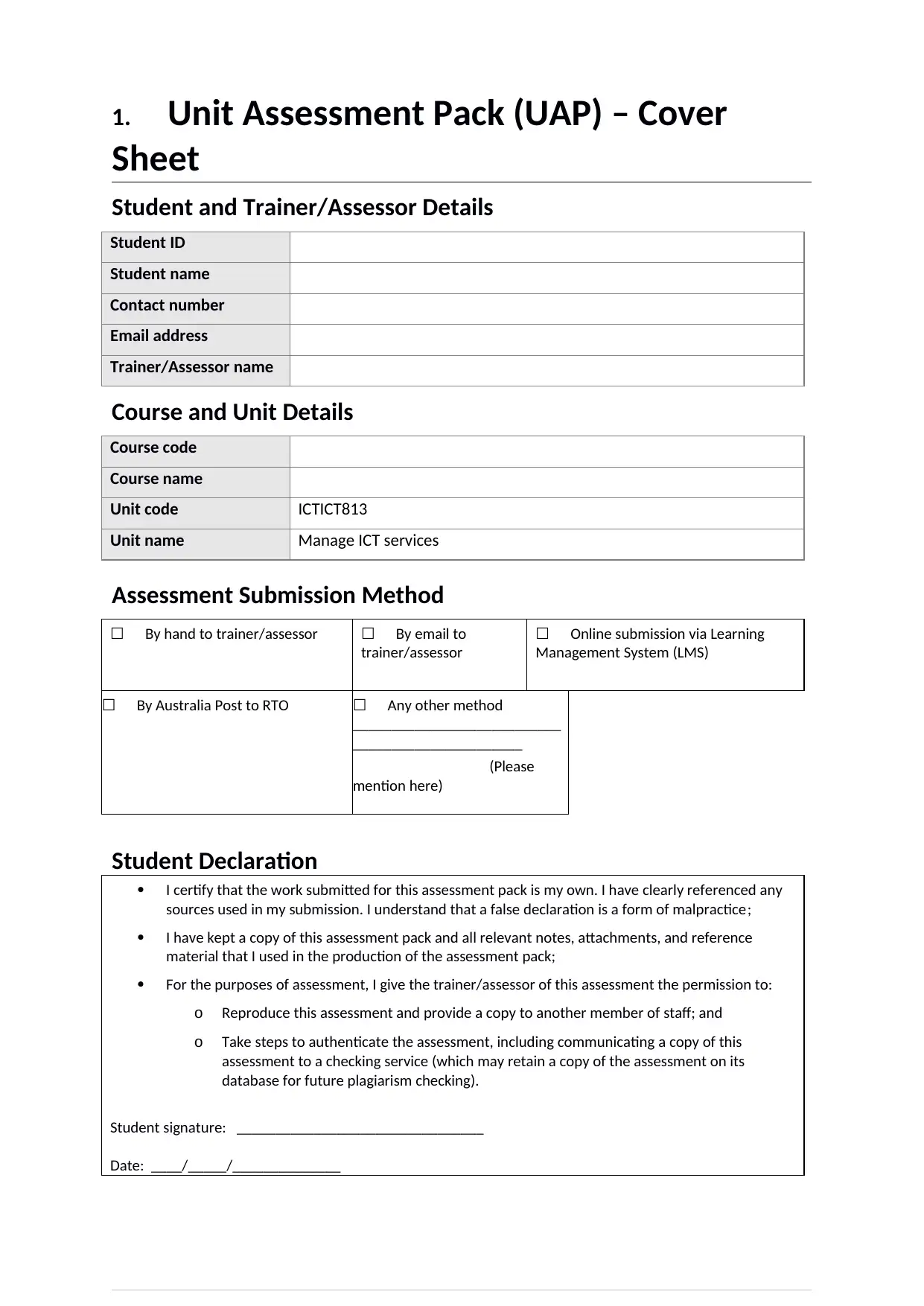
1. Unit Assessment Pack (UAP) – Cover
Sheet
Student and Trainer/Assessor Details
Student ID
Student name
Contact number
Email address
Trainer/Assessor name
Course and Unit Details
Course code
Course name
Unit code ICTICT813
Unit name Manage ICT services
Assessment Submission Method
☐ By hand to trainer/assessor ☐ By email to
trainer/assessor
☐ Online submission via Learning
Management System (LMS)
☐ By Australia Post to RTO ☐ Any other method
___________________________
______________________
(Please
mention here)
Student Declaration
I certify that the work submitted for this assessment pack is my own. I have clearly referenced any
sources used in my submission. I understand that a false declaration is a form of malpractice;
I have kept a copy of this assessment pack and all relevant notes, attachments, and reference
material that I used in the production of the assessment pack;
For the purposes of assessment, I give the trainer/assessor of this assessment the permission to:
o Reproduce this assessment and provide a copy to another member of staff; and
o Take steps to authenticate the assessment, including communicating a copy of this
assessment to a checking service (which may retain a copy of the assessment on its
database for future plagiarism checking).
Student signature: ________________________________
Date: ____/_____/______________
Sheet
Student and Trainer/Assessor Details
Student ID
Student name
Contact number
Email address
Trainer/Assessor name
Course and Unit Details
Course code
Course name
Unit code ICTICT813
Unit name Manage ICT services
Assessment Submission Method
☐ By hand to trainer/assessor ☐ By email to
trainer/assessor
☐ Online submission via Learning
Management System (LMS)
☐ By Australia Post to RTO ☐ Any other method
___________________________
______________________
(Please
mention here)
Student Declaration
I certify that the work submitted for this assessment pack is my own. I have clearly referenced any
sources used in my submission. I understand that a false declaration is a form of malpractice;
I have kept a copy of this assessment pack and all relevant notes, attachments, and reference
material that I used in the production of the assessment pack;
For the purposes of assessment, I give the trainer/assessor of this assessment the permission to:
o Reproduce this assessment and provide a copy to another member of staff; and
o Take steps to authenticate the assessment, including communicating a copy of this
assessment to a checking service (which may retain a copy of the assessment on its
database for future plagiarism checking).
Student signature: ________________________________
Date: ____/_____/______________
Paraphrase This Document
Need a fresh take? Get an instant paraphrase of this document with our AI Paraphraser
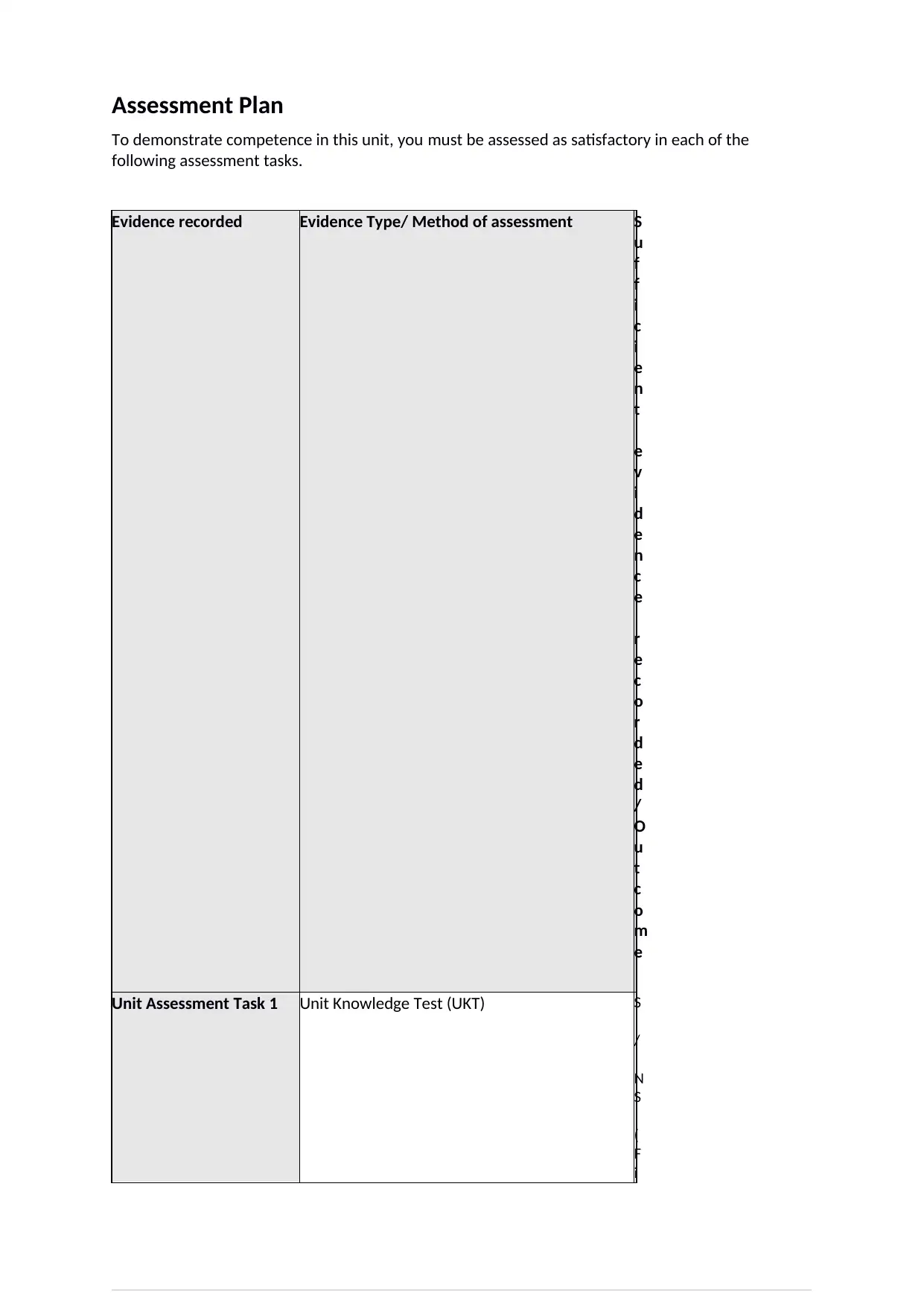
Assessment Plan
To demonstrate competence in this unit, you must be assessed as satisfactory in each of the
following assessment tasks.
Evidence recorded Evidence Type/ Method of assessment S
u
f
f
i
c
i
e
n
t
e
v
i
d
e
n
c
e
r
e
c
o
r
d
e
d
/
O
u
t
c
o
m
e
Unit Assessment Task 1 Unit Knowledge Test (UKT) S
/
N
S
(
F
i
To demonstrate competence in this unit, you must be assessed as satisfactory in each of the
following assessment tasks.
Evidence recorded Evidence Type/ Method of assessment S
u
f
f
i
c
i
e
n
t
e
v
i
d
e
n
c
e
r
e
c
o
r
d
e
d
/
O
u
t
c
o
m
e
Unit Assessment Task 1 Unit Knowledge Test (UKT) S
/
N
S
(
F
i
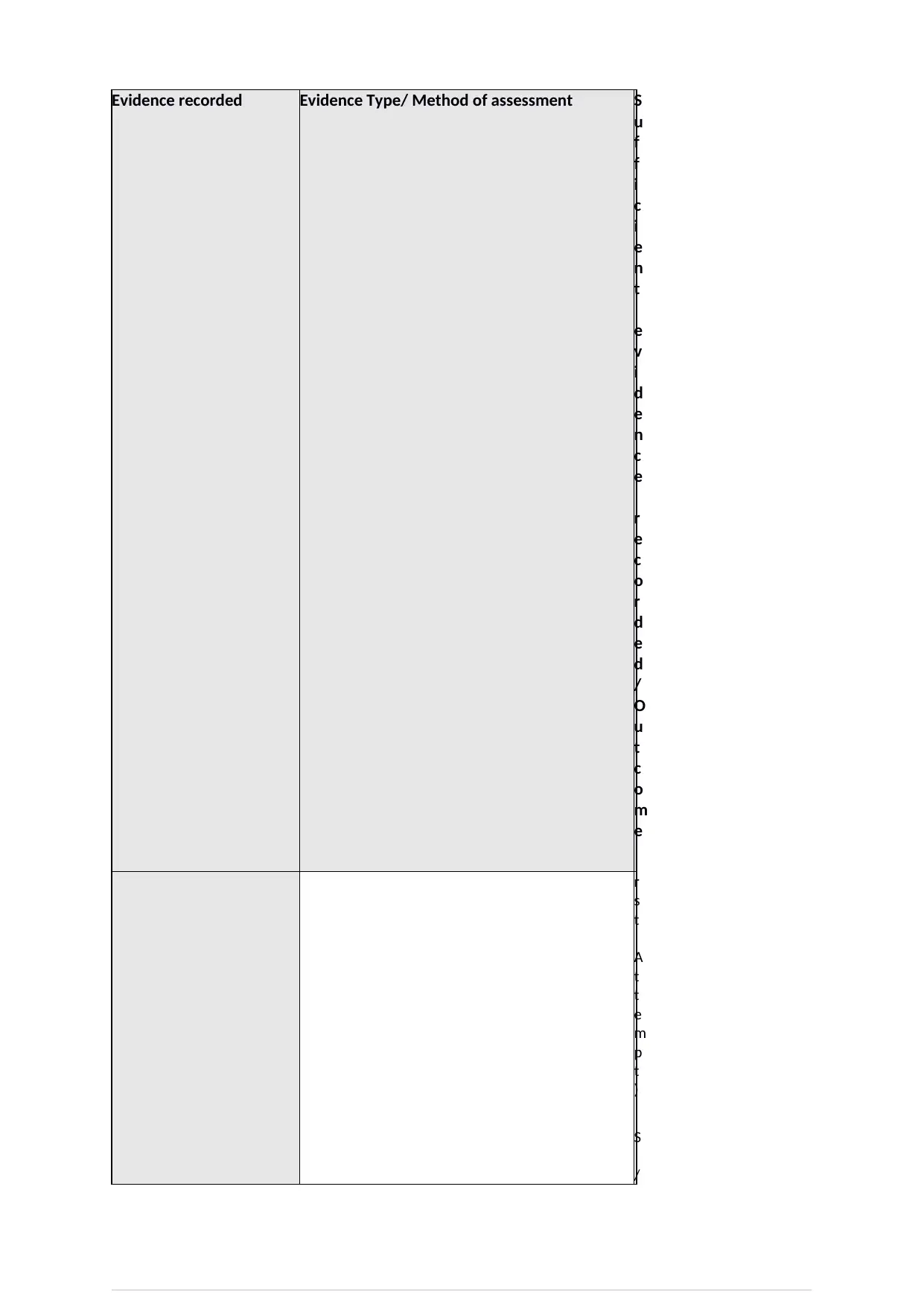
Evidence recorded Evidence Type/ Method of assessment S
u
f
f
i
c
i
e
n
t
e
v
i
d
e
n
c
e
r
e
c
o
r
d
e
d
/
O
u
t
c
o
m
e
r
s
t
A
t
t
e
m
p
t
)
S
/
u
f
f
i
c
i
e
n
t
e
v
i
d
e
n
c
e
r
e
c
o
r
d
e
d
/
O
u
t
c
o
m
e
r
s
t
A
t
t
e
m
p
t
)
S
/
⊘ This is a preview!⊘
Do you want full access?
Subscribe today to unlock all pages.

Trusted by 1+ million students worldwide
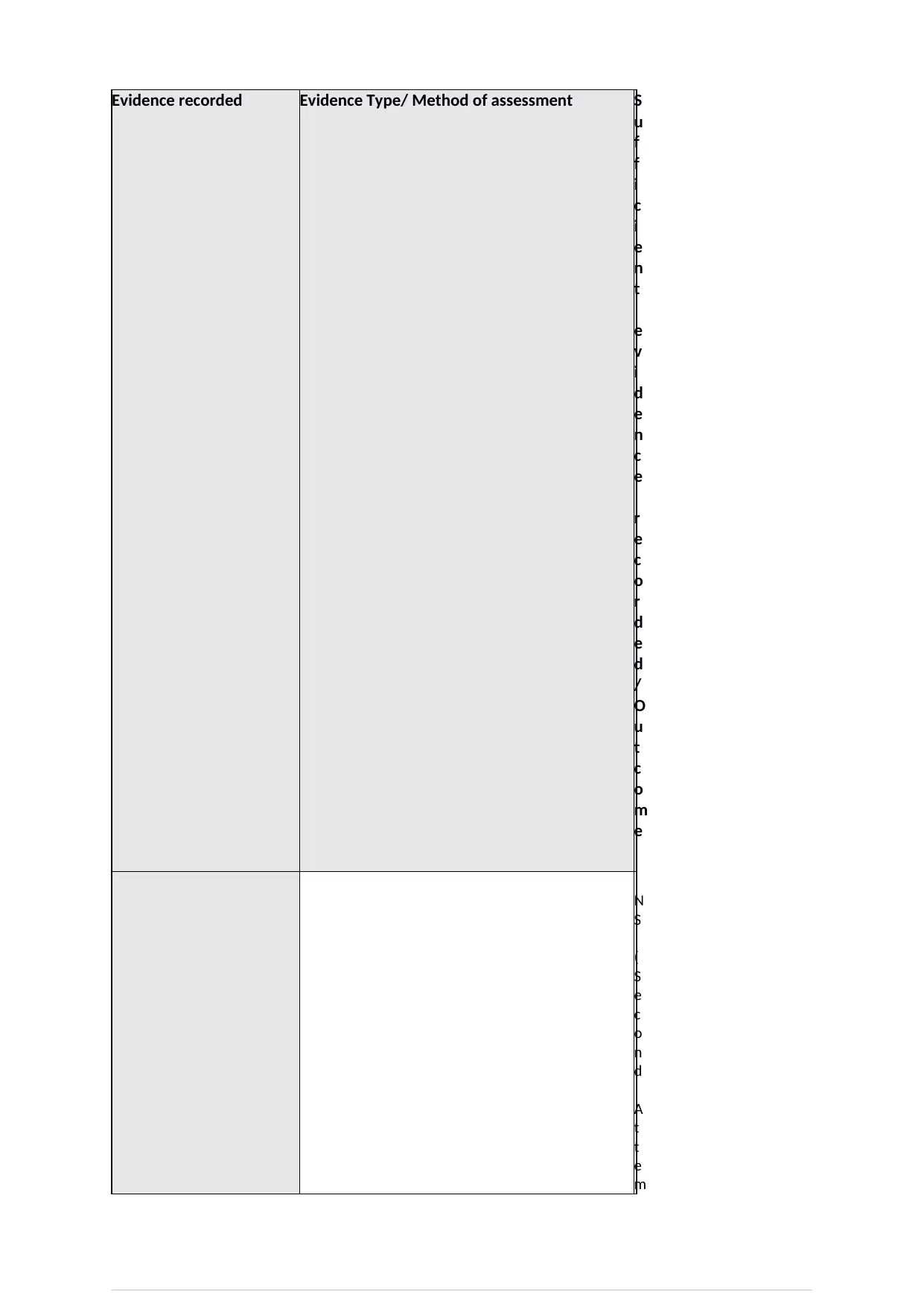
Evidence recorded Evidence Type/ Method of assessment S
u
f
f
i
c
i
e
n
t
e
v
i
d
e
n
c
e
r
e
c
o
r
d
e
d
/
O
u
t
c
o
m
e
N
S
(
S
e
c
o
n
d
A
t
t
e
m
u
f
f
i
c
i
e
n
t
e
v
i
d
e
n
c
e
r
e
c
o
r
d
e
d
/
O
u
t
c
o
m
e
N
S
(
S
e
c
o
n
d
A
t
t
e
m
Paraphrase This Document
Need a fresh take? Get an instant paraphrase of this document with our AI Paraphraser
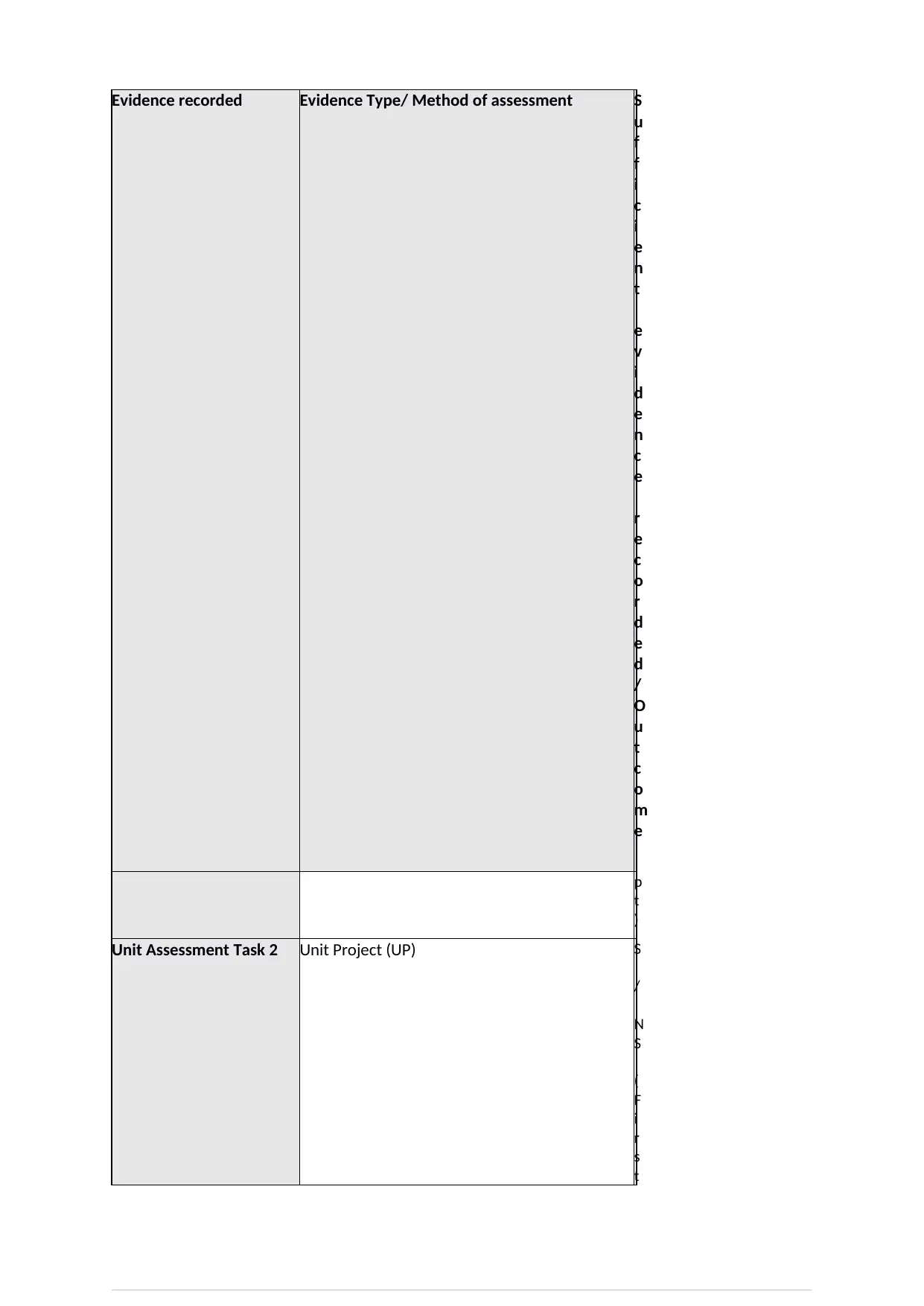
Evidence recorded Evidence Type/ Method of assessment S
u
f
f
i
c
i
e
n
t
e
v
i
d
e
n
c
e
r
e
c
o
r
d
e
d
/
O
u
t
c
o
m
e
p
t
)
Unit Assessment Task 2 Unit Project (UP) S
/
N
S
(
F
i
r
s
t
u
f
f
i
c
i
e
n
t
e
v
i
d
e
n
c
e
r
e
c
o
r
d
e
d
/
O
u
t
c
o
m
e
p
t
)
Unit Assessment Task 2 Unit Project (UP) S
/
N
S
(
F
i
r
s
t
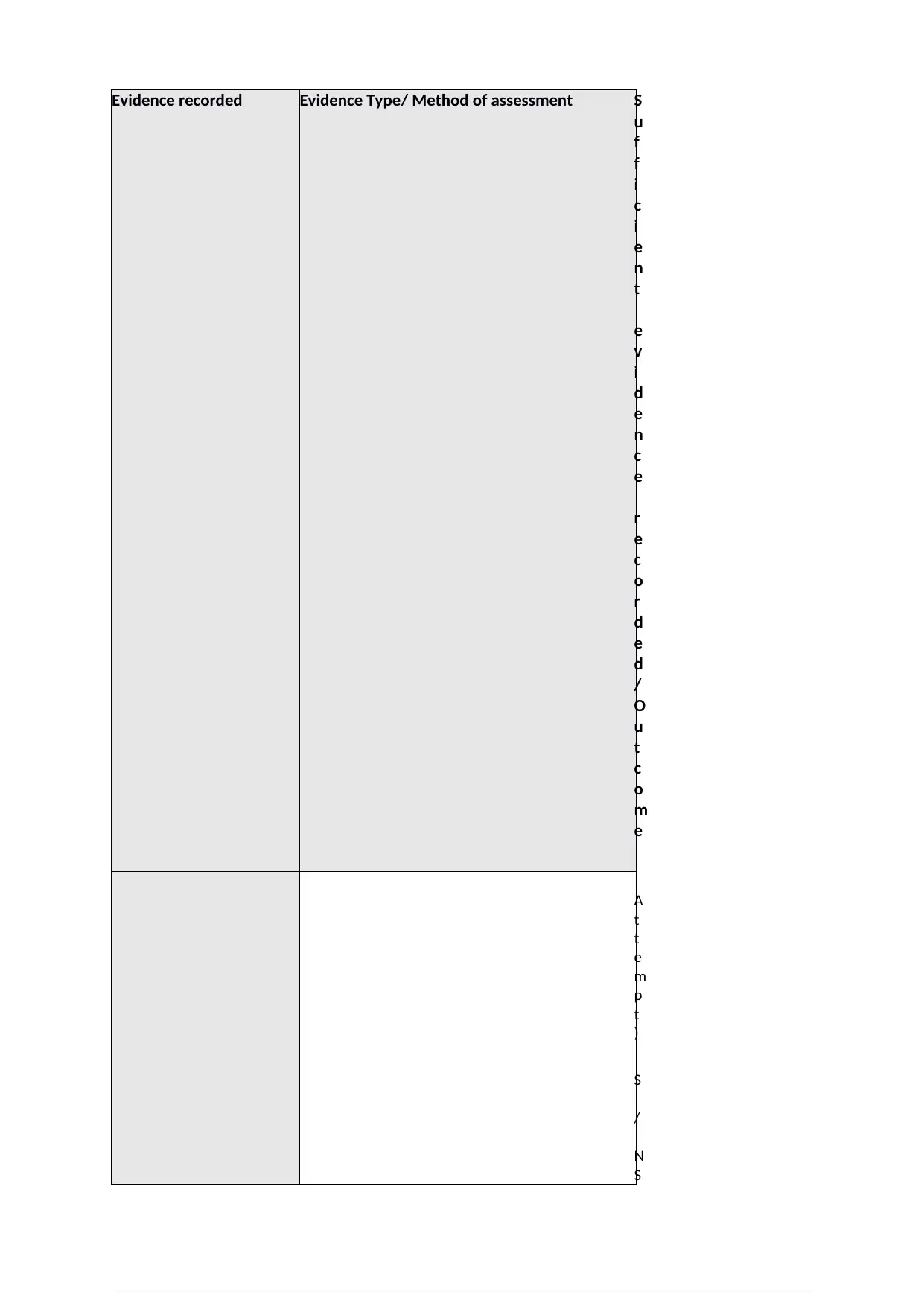
Evidence recorded Evidence Type/ Method of assessment S
u
f
f
i
c
i
e
n
t
e
v
i
d
e
n
c
e
r
e
c
o
r
d
e
d
/
O
u
t
c
o
m
e
A
t
t
e
m
p
t
)
S
/
N
S
u
f
f
i
c
i
e
n
t
e
v
i
d
e
n
c
e
r
e
c
o
r
d
e
d
/
O
u
t
c
o
m
e
A
t
t
e
m
p
t
)
S
/
N
S
⊘ This is a preview!⊘
Do you want full access?
Subscribe today to unlock all pages.

Trusted by 1+ million students worldwide
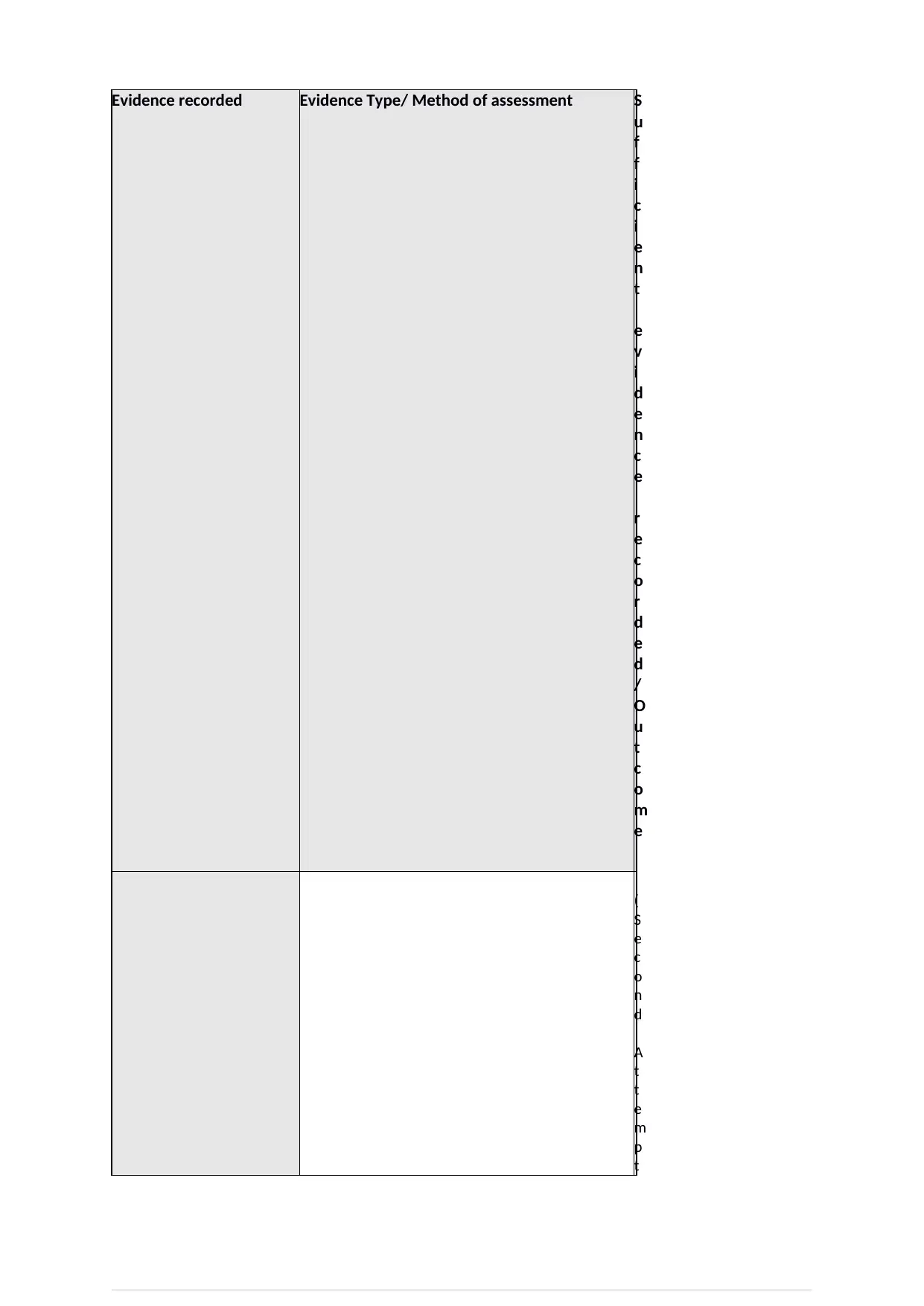
Evidence recorded Evidence Type/ Method of assessment S
u
f
f
i
c
i
e
n
t
e
v
i
d
e
n
c
e
r
e
c
o
r
d
e
d
/
O
u
t
c
o
m
e
(
S
e
c
o
n
d
A
t
t
e
m
p
t
u
f
f
i
c
i
e
n
t
e
v
i
d
e
n
c
e
r
e
c
o
r
d
e
d
/
O
u
t
c
o
m
e
(
S
e
c
o
n
d
A
t
t
e
m
p
t
Paraphrase This Document
Need a fresh take? Get an instant paraphrase of this document with our AI Paraphraser
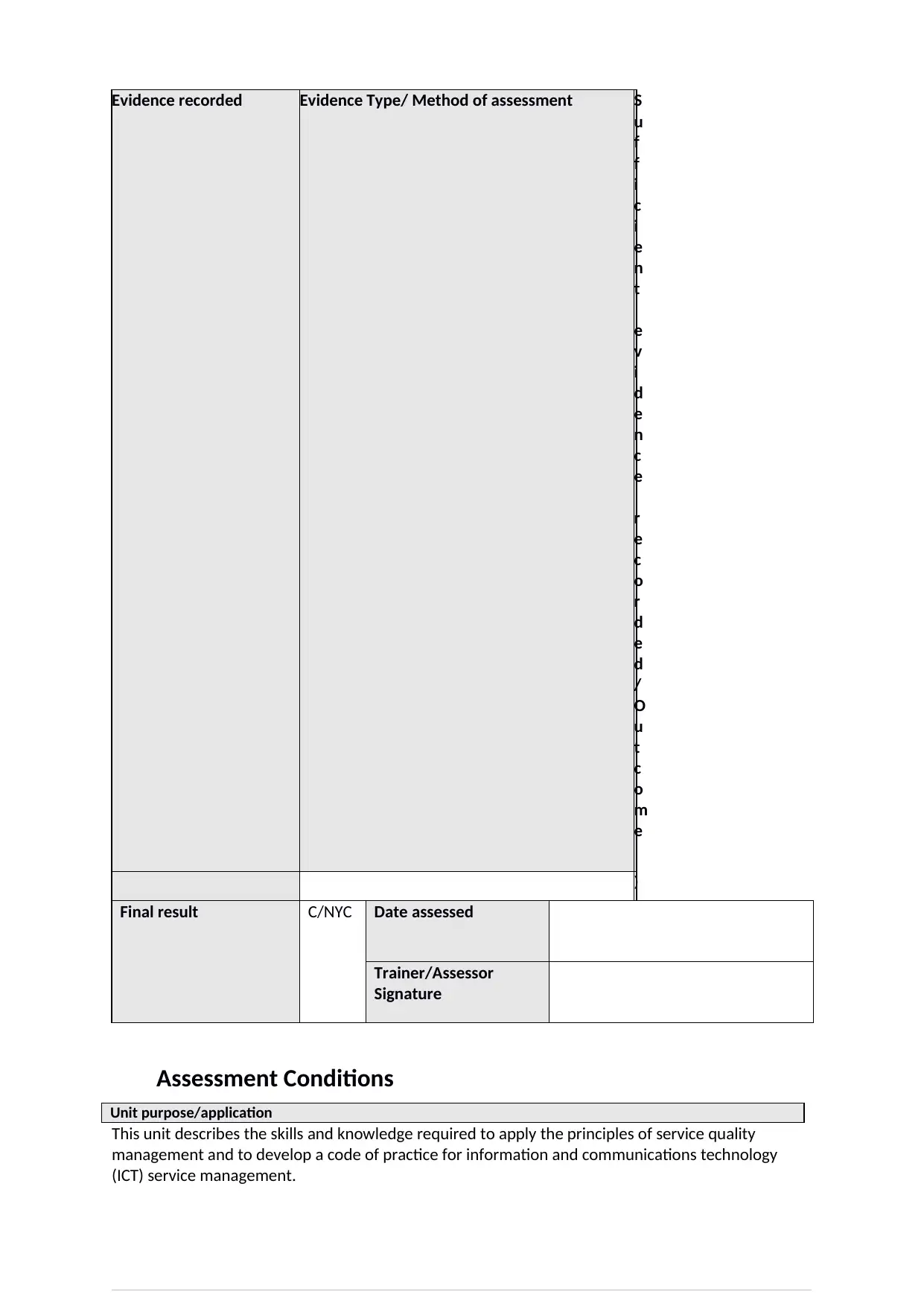
Evidence recorded Evidence Type/ Method of assessment S
u
f
f
i
c
i
e
n
t
e
v
i
d
e
n
c
e
r
e
c
o
r
d
e
d
/
O
u
t
c
o
m
e
)
Final result C/NYC Date assessed
Trainer/Assessor
Signature
Assessment Conditions
Unit purpose/application
This unit describes the skills and knowledge required to apply the principles of service quality
management and to develop a code of practice for information and communications technology
(ICT) service management.
u
f
f
i
c
i
e
n
t
e
v
i
d
e
n
c
e
r
e
c
o
r
d
e
d
/
O
u
t
c
o
m
e
)
Final result C/NYC Date assessed
Trainer/Assessor
Signature
Assessment Conditions
Unit purpose/application
This unit describes the skills and knowledge required to apply the principles of service quality
management and to develop a code of practice for information and communications technology
(ICT) service management.
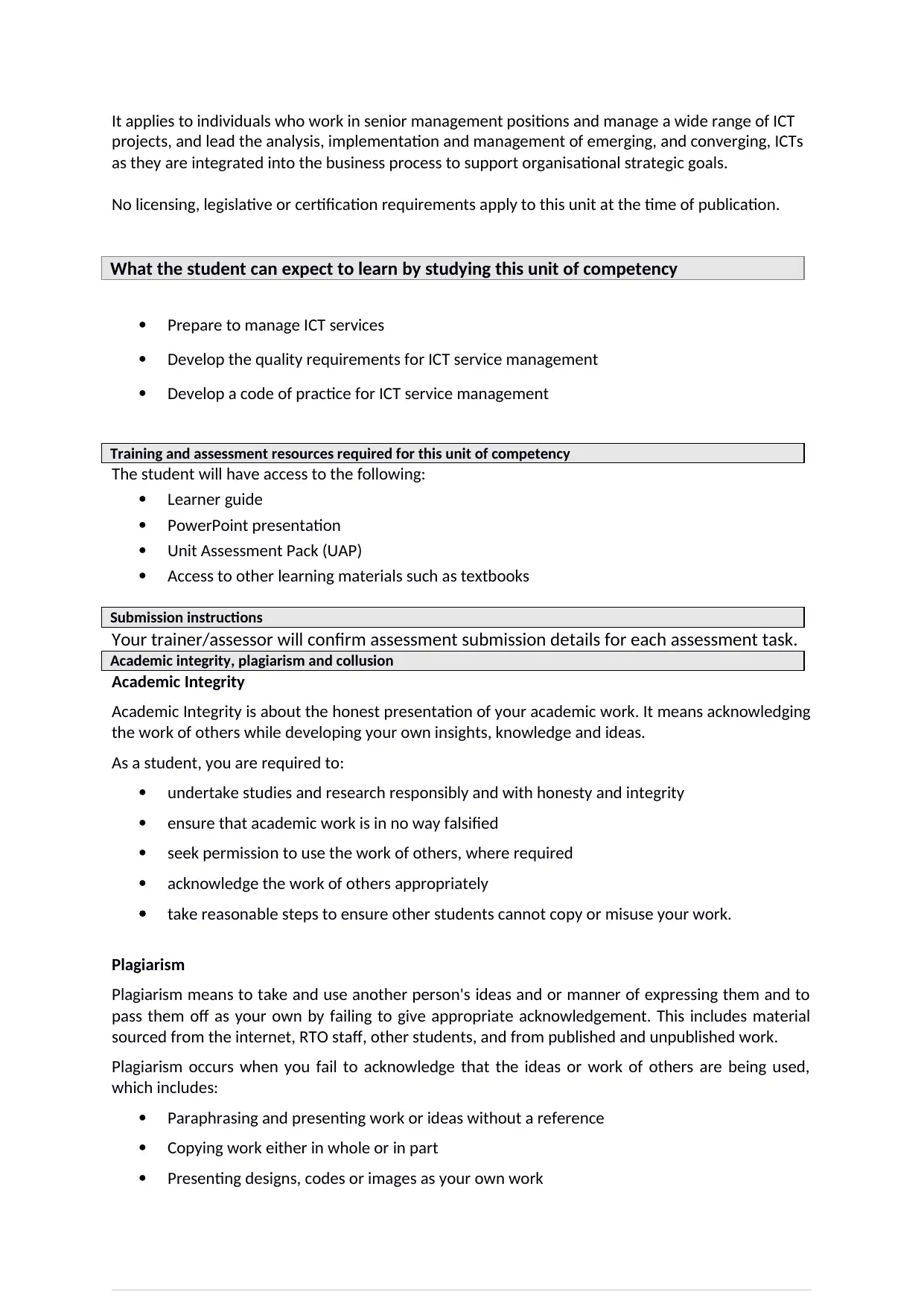
It applies to individuals who work in senior management positions and manage a wide range of ICT
projects, and lead the analysis, implementation and management of emerging, and converging, ICTs
as they are integrated into the business process to support organisational strategic goals.
No licensing, legislative or certification requirements apply to this unit at the time of publication.
What the student can expect to learn by studying this unit of competency
Prepare to manage ICT services
Develop the quality requirements for ICT service management
Develop a code of practice for ICT service management
Training and assessment resources required for this unit of competency
The student will have access to the following:
Learner guide
PowerPoint presentation
Unit Assessment Pack (UAP)
Access to other learning materials such as textbooks
Submission instructions
Your trainer/assessor will confirm assessment submission details for each assessment task.
Academic integrity, plagiarism and collusion
Academic Integrity
Academic Integrity is about the honest presentation of your academic work. It means acknowledging
the work of others while developing your own insights, knowledge and ideas.
As a student, you are required to:
undertake studies and research responsibly and with honesty and integrity
ensure that academic work is in no way falsified
seek permission to use the work of others, where required
acknowledge the work of others appropriately
take reasonable steps to ensure other students cannot copy or misuse your work.
Plagiarism
Plagiarism means to take and use another person's ideas and or manner of expressing them and to
pass them off as your own by failing to give appropriate acknowledgement. This includes material
sourced from the internet, RTO staff, other students, and from published and unpublished work.
Plagiarism occurs when you fail to acknowledge that the ideas or work of others are being used,
which includes:
Paraphrasing and presenting work or ideas without a reference
Copying work either in whole or in part
Presenting designs, codes or images as your own work
projects, and lead the analysis, implementation and management of emerging, and converging, ICTs
as they are integrated into the business process to support organisational strategic goals.
No licensing, legislative or certification requirements apply to this unit at the time of publication.
What the student can expect to learn by studying this unit of competency
Prepare to manage ICT services
Develop the quality requirements for ICT service management
Develop a code of practice for ICT service management
Training and assessment resources required for this unit of competency
The student will have access to the following:
Learner guide
PowerPoint presentation
Unit Assessment Pack (UAP)
Access to other learning materials such as textbooks
Submission instructions
Your trainer/assessor will confirm assessment submission details for each assessment task.
Academic integrity, plagiarism and collusion
Academic Integrity
Academic Integrity is about the honest presentation of your academic work. It means acknowledging
the work of others while developing your own insights, knowledge and ideas.
As a student, you are required to:
undertake studies and research responsibly and with honesty and integrity
ensure that academic work is in no way falsified
seek permission to use the work of others, where required
acknowledge the work of others appropriately
take reasonable steps to ensure other students cannot copy or misuse your work.
Plagiarism
Plagiarism means to take and use another person's ideas and or manner of expressing them and to
pass them off as your own by failing to give appropriate acknowledgement. This includes material
sourced from the internet, RTO staff, other students, and from published and unpublished work.
Plagiarism occurs when you fail to acknowledge that the ideas or work of others are being used,
which includes:
Paraphrasing and presenting work or ideas without a reference
Copying work either in whole or in part
Presenting designs, codes or images as your own work
⊘ This is a preview!⊘
Do you want full access?
Subscribe today to unlock all pages.

Trusted by 1+ million students worldwide
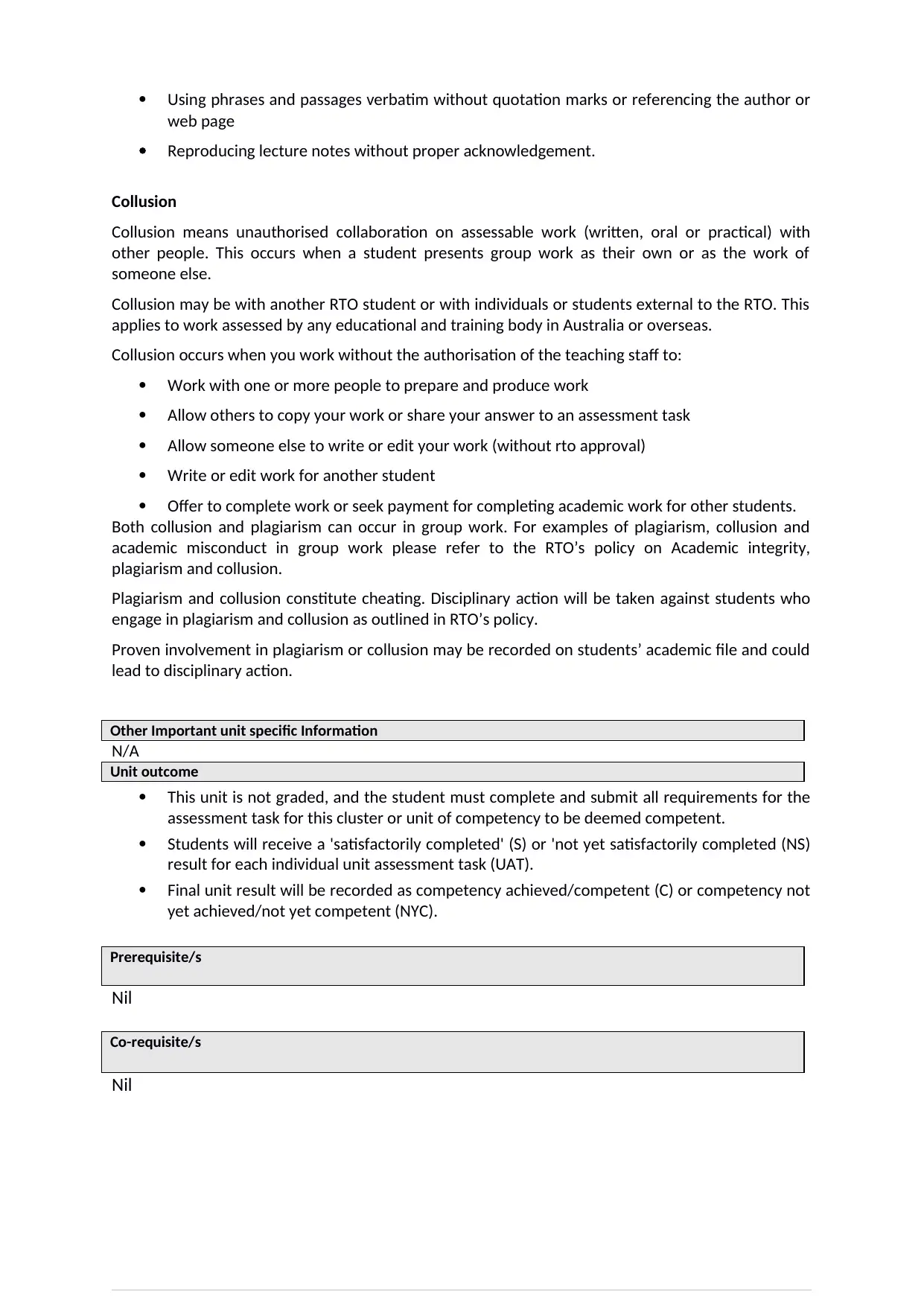
Using phrases and passages verbatim without quotation marks or referencing the author or
web page
Reproducing lecture notes without proper acknowledgement.
Collusion
Collusion means unauthorised collaboration on assessable work (written, oral or practical) with
other people. This occurs when a student presents group work as their own or as the work of
someone else.
Collusion may be with another RTO student or with individuals or students external to the RTO. This
applies to work assessed by any educational and training body in Australia or overseas.
Collusion occurs when you work without the authorisation of the teaching staff to:
Work with one or more people to prepare and produce work
Allow others to copy your work or share your answer to an assessment task
Allow someone else to write or edit your work (without rto approval)
Write or edit work for another student
Offer to complete work or seek payment for completing academic work for other students.
Both collusion and plagiarism can occur in group work. For examples of plagiarism, collusion and
academic misconduct in group work please refer to the RTO’s policy on Academic integrity,
plagiarism and collusion.
Plagiarism and collusion constitute cheating. Disciplinary action will be taken against students who
engage in plagiarism and collusion as outlined in RTO’s policy.
Proven involvement in plagiarism or collusion may be recorded on students’ academic file and could
lead to disciplinary action.
Other Important unit specific Information
N/A
Unit outcome
This unit is not graded, and the student must complete and submit all requirements for the
assessment task for this cluster or unit of competency to be deemed competent.
Students will receive a 'satisfactorily completed' (S) or 'not yet satisfactorily completed (NS)
result for each individual unit assessment task (UAT).
Final unit result will be recorded as competency achieved/competent (C) or competency not
yet achieved/not yet competent (NYC).
Prerequisite/s
Nil
Co-requisite/s
Nil
web page
Reproducing lecture notes without proper acknowledgement.
Collusion
Collusion means unauthorised collaboration on assessable work (written, oral or practical) with
other people. This occurs when a student presents group work as their own or as the work of
someone else.
Collusion may be with another RTO student or with individuals or students external to the RTO. This
applies to work assessed by any educational and training body in Australia or overseas.
Collusion occurs when you work without the authorisation of the teaching staff to:
Work with one or more people to prepare and produce work
Allow others to copy your work or share your answer to an assessment task
Allow someone else to write or edit your work (without rto approval)
Write or edit work for another student
Offer to complete work or seek payment for completing academic work for other students.
Both collusion and plagiarism can occur in group work. For examples of plagiarism, collusion and
academic misconduct in group work please refer to the RTO’s policy on Academic integrity,
plagiarism and collusion.
Plagiarism and collusion constitute cheating. Disciplinary action will be taken against students who
engage in plagiarism and collusion as outlined in RTO’s policy.
Proven involvement in plagiarism or collusion may be recorded on students’ academic file and could
lead to disciplinary action.
Other Important unit specific Information
N/A
Unit outcome
This unit is not graded, and the student must complete and submit all requirements for the
assessment task for this cluster or unit of competency to be deemed competent.
Students will receive a 'satisfactorily completed' (S) or 'not yet satisfactorily completed (NS)
result for each individual unit assessment task (UAT).
Final unit result will be recorded as competency achieved/competent (C) or competency not
yet achieved/not yet competent (NYC).
Prerequisite/s
Nil
Co-requisite/s
Nil
Paraphrase This Document
Need a fresh take? Get an instant paraphrase of this document with our AI Paraphraser
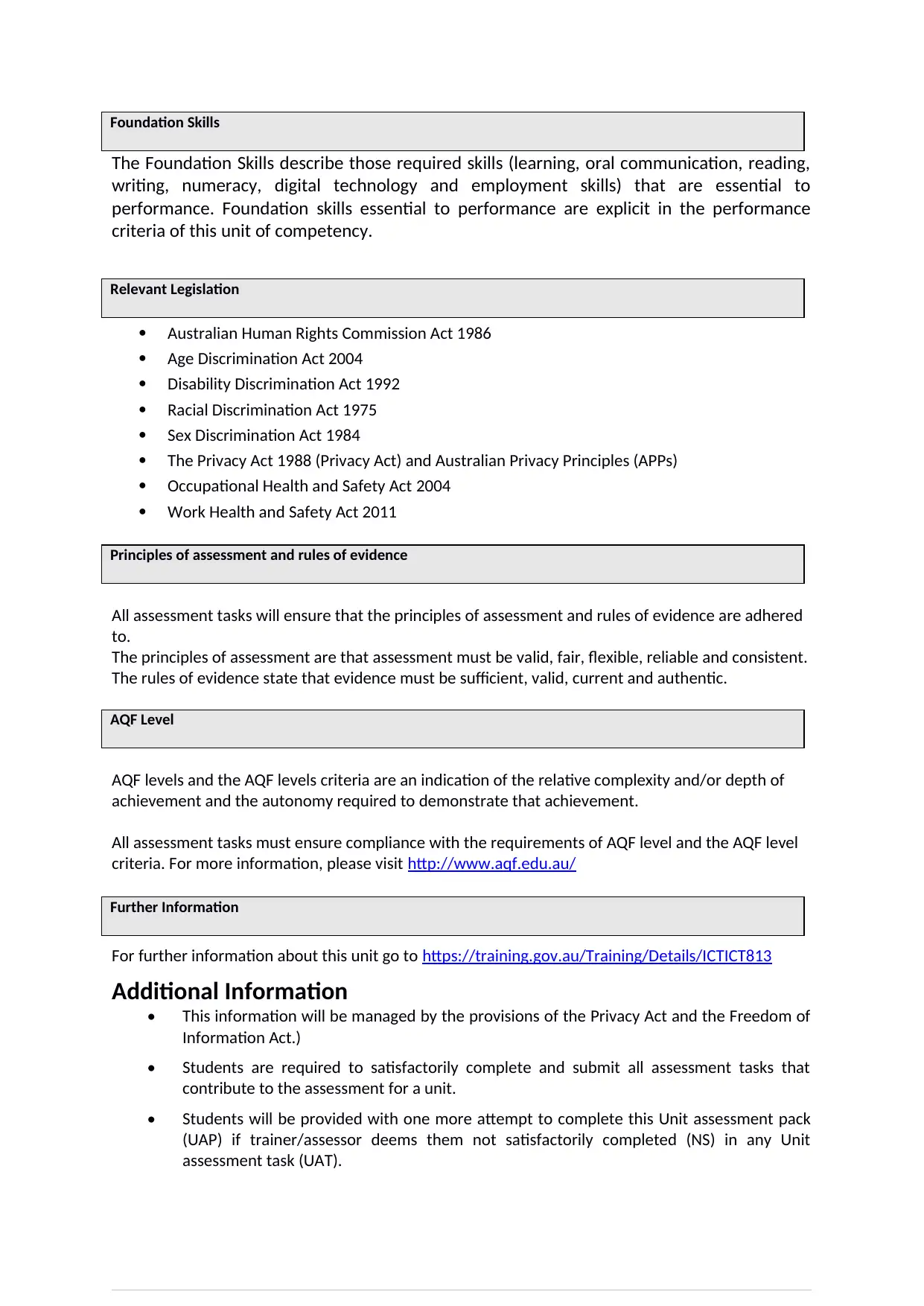
Foundation Skills
The Foundation Skills describe those required skills (learning, oral communication, reading,
writing, numeracy, digital technology and employment skills) that are essential to
performance. Foundation skills essential to performance are explicit in the performance
criteria of this unit of competency.
Relevant Legislation
Australian Human Rights Commission Act 1986
Age Discrimination Act 2004
Disability Discrimination Act 1992
Racial Discrimination Act 1975
Sex Discrimination Act 1984
The Privacy Act 1988 (Privacy Act) and Australian Privacy Principles (APPs)
Occupational Health and Safety Act 2004
Work Health and Safety Act 2011
Principles of assessment and rules of evidence
All assessment tasks will ensure that the principles of assessment and rules of evidence are adhered
to.
The principles of assessment are that assessment must be valid, fair, flexible, reliable and consistent.
The rules of evidence state that evidence must be sufficient, valid, current and authentic.
AQF Level
AQF levels and the AQF levels criteria are an indication of the relative complexity and/or depth of
achievement and the autonomy required to demonstrate that achievement.
All assessment tasks must ensure compliance with the requirements of AQF level and the AQF level
criteria. For more information, please visit http://www.aqf.edu.au/
Further Information
For further information about this unit go to https://training.gov.au/Training/Details/ICTICT813
Additional Information
• This information will be managed by the provisions of the Privacy Act and the Freedom of
Information Act.)
• Students are required to satisfactorily complete and submit all assessment tasks that
contribute to the assessment for a unit.
• Students will be provided with one more attempt to complete this Unit assessment pack
(UAP) if trainer/assessor deems them not satisfactorily completed (NS) in any Unit
assessment task (UAT).
The Foundation Skills describe those required skills (learning, oral communication, reading,
writing, numeracy, digital technology and employment skills) that are essential to
performance. Foundation skills essential to performance are explicit in the performance
criteria of this unit of competency.
Relevant Legislation
Australian Human Rights Commission Act 1986
Age Discrimination Act 2004
Disability Discrimination Act 1992
Racial Discrimination Act 1975
Sex Discrimination Act 1984
The Privacy Act 1988 (Privacy Act) and Australian Privacy Principles (APPs)
Occupational Health and Safety Act 2004
Work Health and Safety Act 2011
Principles of assessment and rules of evidence
All assessment tasks will ensure that the principles of assessment and rules of evidence are adhered
to.
The principles of assessment are that assessment must be valid, fair, flexible, reliable and consistent.
The rules of evidence state that evidence must be sufficient, valid, current and authentic.
AQF Level
AQF levels and the AQF levels criteria are an indication of the relative complexity and/or depth of
achievement and the autonomy required to demonstrate that achievement.
All assessment tasks must ensure compliance with the requirements of AQF level and the AQF level
criteria. For more information, please visit http://www.aqf.edu.au/
Further Information
For further information about this unit go to https://training.gov.au/Training/Details/ICTICT813
Additional Information
• This information will be managed by the provisions of the Privacy Act and the Freedom of
Information Act.)
• Students are required to satisfactorily complete and submit all assessment tasks that
contribute to the assessment for a unit.
• Students will be provided with one more attempt to complete this Unit assessment pack
(UAP) if trainer/assessor deems them not satisfactorily completed (NS) in any Unit
assessment task (UAT).
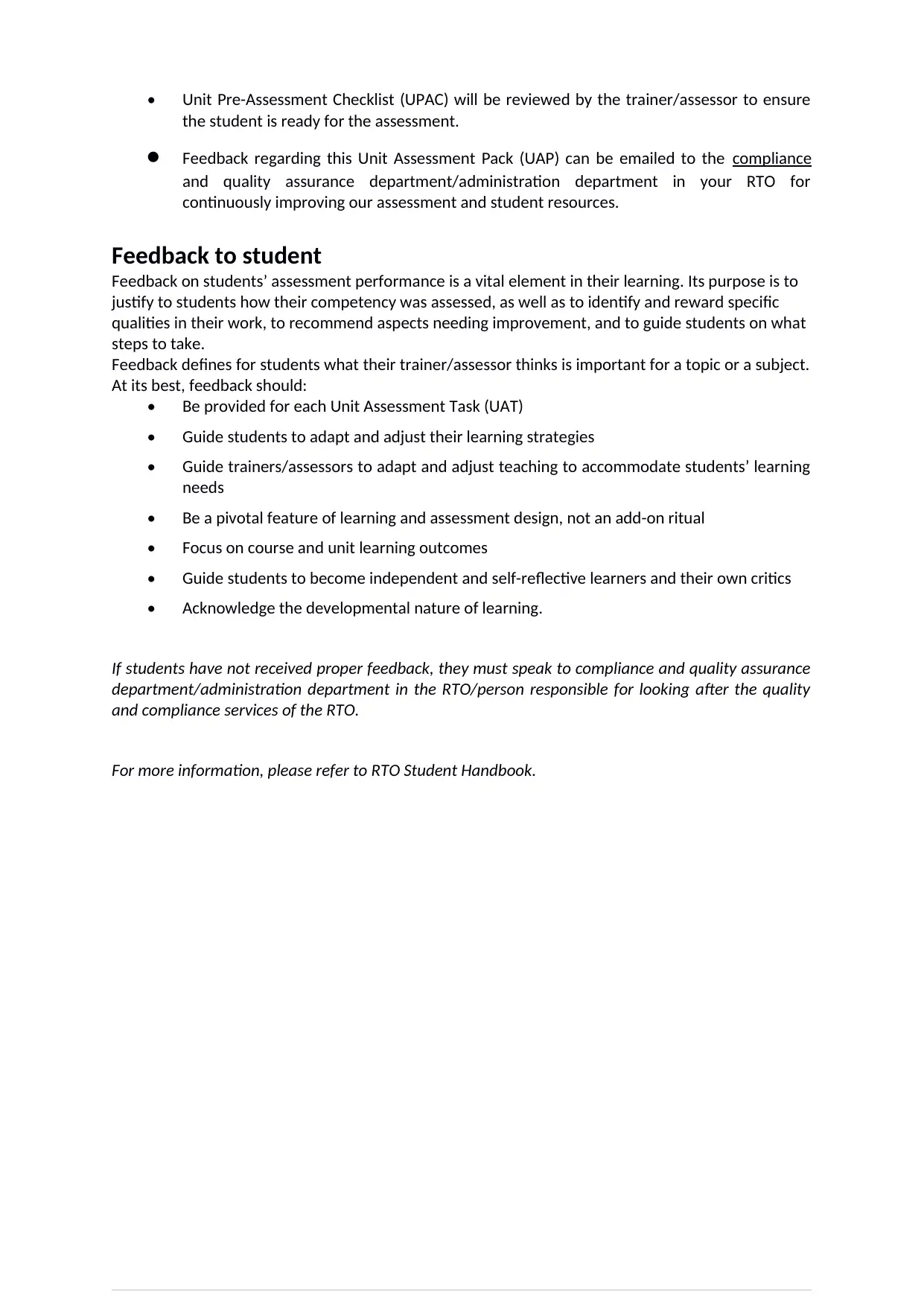
• Unit Pre-Assessment Checklist (UPAC) will be reviewed by the trainer/assessor to ensure
the student is ready for the assessment.
• Feedback regarding this Unit Assessment Pack (UAP) can be emailed to the compliance
and quality assurance department/administration department in your RTO for
continuously improving our assessment and student resources.
Feedback to student
Feedback on students’ assessment performance is a vital element in their learning. Its purpose is to
justify to students how their competency was assessed, as well as to identify and reward specific
qualities in their work, to recommend aspects needing improvement, and to guide students on what
steps to take.
Feedback defines for students what their trainer/assessor thinks is important for a topic or a subject.
At its best, feedback should:
• Be provided for each Unit Assessment Task (UAT)
• Guide students to adapt and adjust their learning strategies
• Guide trainers/assessors to adapt and adjust teaching to accommodate students’ learning
needs
• Be a pivotal feature of learning and assessment design, not an add-on ritual
• Focus on course and unit learning outcomes
• Guide students to become independent and self-reflective learners and their own critics
• Acknowledge the developmental nature of learning.
If students have not received proper feedback, they must speak to compliance and quality assurance
department/administration department in the RTO/person responsible for looking after the quality
and compliance services of the RTO.
For more information, please refer to RTO Student Handbook.
the student is ready for the assessment.
• Feedback regarding this Unit Assessment Pack (UAP) can be emailed to the compliance
and quality assurance department/administration department in your RTO for
continuously improving our assessment and student resources.
Feedback to student
Feedback on students’ assessment performance is a vital element in their learning. Its purpose is to
justify to students how their competency was assessed, as well as to identify and reward specific
qualities in their work, to recommend aspects needing improvement, and to guide students on what
steps to take.
Feedback defines for students what their trainer/assessor thinks is important for a topic or a subject.
At its best, feedback should:
• Be provided for each Unit Assessment Task (UAT)
• Guide students to adapt and adjust their learning strategies
• Guide trainers/assessors to adapt and adjust teaching to accommodate students’ learning
needs
• Be a pivotal feature of learning and assessment design, not an add-on ritual
• Focus on course and unit learning outcomes
• Guide students to become independent and self-reflective learners and their own critics
• Acknowledge the developmental nature of learning.
If students have not received proper feedback, they must speak to compliance and quality assurance
department/administration department in the RTO/person responsible for looking after the quality
and compliance services of the RTO.
For more information, please refer to RTO Student Handbook.
⊘ This is a preview!⊘
Do you want full access?
Subscribe today to unlock all pages.

Trusted by 1+ million students worldwide
1 out of 55
Related Documents
Your All-in-One AI-Powered Toolkit for Academic Success.
+13062052269
info@desklib.com
Available 24*7 on WhatsApp / Email
![[object Object]](/_next/static/media/star-bottom.7253800d.svg)
Unlock your academic potential
Copyright © 2020–2026 A2Z Services. All Rights Reserved. Developed and managed by ZUCOL.





